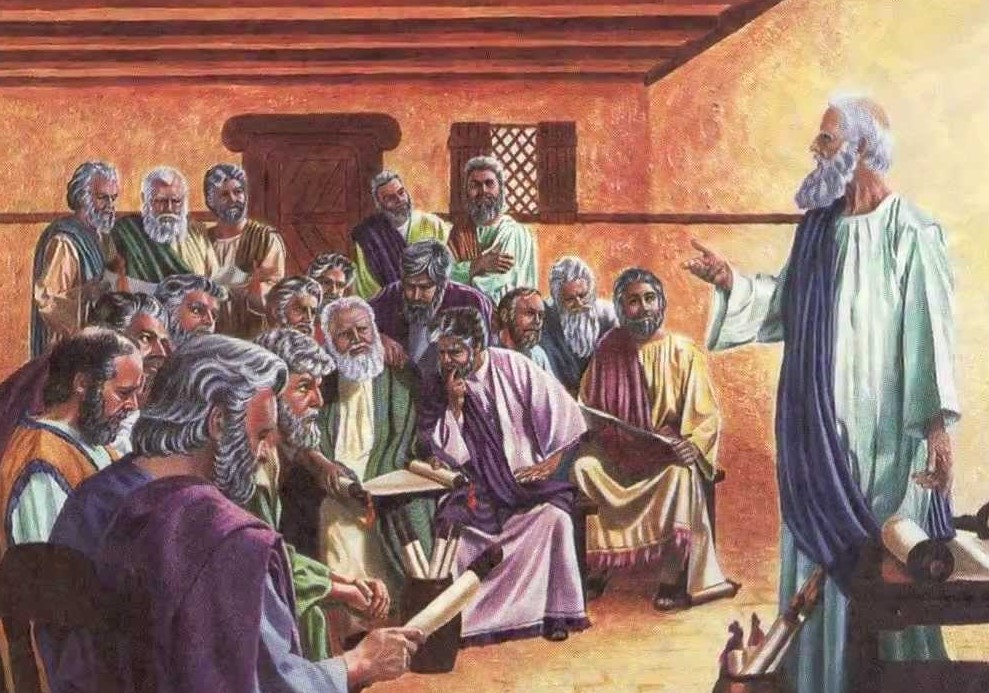
Acts 15
Acts 15:1, Custom of Moses. What is the “custom” or “manner” of Moses as mentioned in Acts 15:1? Likely it is the Torah principle that circumcision of both the flesh and the heart is a requirement for citizenship in the nation of Israel. However, the latter takes precedence over and is at a higher spiritual level than the former, as we will now discuss.
The Torah-law requires physical circumcision of males, who the spiritual heads of their families as a ritual signifying sanctification (or being set apart or being separated) from the carnal rudiments of this world, the flesh and the devil. When the father, as the spiritual representative and head of his family, was physically circumcised, it is as if his whole family (including the females) were circumcised as well.

But physical circumcision as Scripture, including the Torah, teaches is but a step toward and points to the higher principle of heart circumcision, which all people (both male and female) must undergo if they are to be part of the “Israel of Elohim” (Gal 6:16), which is comprised of both Jews and non-Jews, who have been grafted into the olive tree of Israel (Rom 11:11–32) and are not part of the nation of Israel through Yeshua the Messiah and are no longer Gentiles (in a spiritual sense; Eph 2:11–19).
So the overall principle of circumcision comes from the YHVH Elohim. How it was specifically implemented and applied in daily life, or the exact details of how the law of circumcision was walked out, is specific to the era in which the people of Elohim lived. This is a fundamental distinction between the basic, eternal and over-arching principles of the Elohim’s Torah-law compared to “the law of Moses.” The principles of the former are for all time and for all people, while the latter are the specifics of how those principles were applied in the daily lives of a particular people at a particular time—in this case, the children of Israel who had a physical nation governed by many laws (i.e. the law of Moses) specific to that situation. In the case of physical circumcision, it was a physical proof of citizenship, like a passport, that one actually wore on one’s body. Since there is no longer a physical nation of Israel as in ancient times, this specific law is not applicable in the same way as it was then; however, the higher principle of heart circumcision still applies today and includes both males and females.
Another example of a literal Torah principle that does not apply to us today is the Torah’s ox in a ditch rule. Today, how many of us now use an ox for work or transpiration? Obviously we do not, but the principle of the pulling an ox out of the ditch on the Sabbath day still applies to us but in a different way, even though most of us have never even seen an ox much less own or use one. This principle allows us to help someone in need, or to perform emergency word on the Sabbath, which would otherwise be a violation of the biblical law to rest on that day. The eternal principles of the Torah, like the laws of circumcision and ox in the ditch, never change, but exactly how these principles are applied may vary from one generation and culture to another.
This concept is very different than what the Christian church teaches about the law of Moses, which they say was “fulfilled” by Yeshua, which they take to mean was “done away with” or abrogated, so that we no longer have to do it. This concept, of course, is fundamentally flawed and illogical and is patently absurd, since it violates countless Scripture from one end of the Bible to the other that specifically uphold the validity of the Torah for all believers for all time. If the Torah was in fact been “done away with,” as the church teaches, then it logically follows that it is now permissible to murder, lie, have sex with animals, not have to tithe to your church, be a homosexual, etc., etc. Of course, this is patently ridiculous, yet this is, in essence, shows the logical fallacy of what church teaches with regard to the Torah-law of Elohim.
Continue reading



